七年级英语下册Unit12Whatdidyoudolastweekend语法篇试题新版人教新目标版227
- 格式:doc
- 大小:1.18 MB
- 文档页数:16
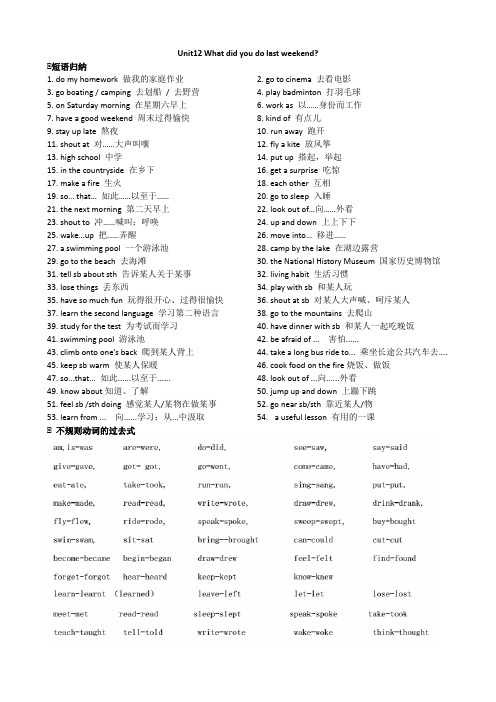
Unit12 What did you do last weekend?◆短语归纳1. do my homework 做我的家庭作业2. go to cinema 去看电影3. go boating / camping 去划船/ 去野营4. play badminton 打羽毛球5. on Saturday morning 在星期六早上6. work as 以……身份而工作7. have a good weekend 周末过得愉快8. kind of 有点儿9. stay up late 熬夜10. run away 跑开11. shout at 对……大声叫嚷12. fly a kite 放风筝13. high school 中学14. put up 搭起,举起15. in the countryside 在乡下16. get a surprise 吃惊17. make a fire 生火18. each other 互相19. so… that… 如此……以至于……20. go to sleep 入睡21. the next morning 第二天早上22. look out of…向……外看23. shout to 冲……喊叫;呼唤24. up and down 上上下下25. wake…up 把……弄醒26. move into… 移进……27. a swimming pool 一个游泳池28. camp by the lake 在湖边露营29. go to the beach 去海滩30. the National History Museum 国家历史博物馆31. tell sb about sth 告诉某人关于某事32. living habit 生活习惯33. lose things 丢东西34. play with sb 和某人玩35. have so much fun 玩得很开心、过得很愉快36. shout at sb 对某人大声喊、呵斥某人37. learn the second language 学习第二种语言38. go to the mountains 去爬山39. study for the test 为考试而学习40. have dinner with sb 和某人一起吃晚饭41. swimming pool 游泳池42. be afraid of ... 害怕......43. climb onto one’s back 爬到某人背上44. take a long bus ride to... 乘坐长途公共汽车去....45. keep sb warm 使某人保暖46. cook food on the fire烧饭、做饭47. so...that... 如此......以至于...... 48. look out of ...向......外看49. know about知道、了解50. jump up and down 上蹦下跳51. feel sb /sth doing 感觉某人/某物在做某事52. go near sb/sth 靠近某人/物53. learn from ... 向......学习;从...中汲取54. a useful lesson 有用的一课◆不规则动词的过去式◆用法集萃1. go + doing 去做某事2. play + 球类玩……球3. 时间段+ ago ……前4. keep + sb. / sth. + 形容词/ 副词/ 介词短语使……保持……5. so + 形容词/ 副词+ that 句子如此……以至于……6. see sb. doing sth. 看见某人正在做某事7. let sb. do sth. 让某人做某事8. start to do / doing sth. 开始做某事◆典句必背1. —What did you do last weekend? 上个周末你做什么了?—I did my homework. / We went boating. 我做了我的家庭作业。
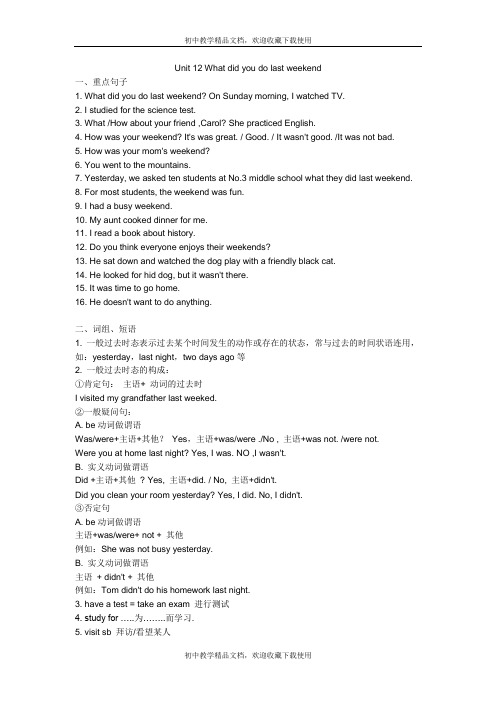
Unit 12 What did you do last weekend一、重点句子1. What did you do last weekend? On Sunday morning, I watched TV.2. I studied for the science test.3. What /How about your friend ,Carol? She practiced English.4. How was your weekend? It's was great. / Good. / It wasn't good. /It was not bad.5. How was your mom's weekend?6. You went to the mountains.7. Yesterday, we asked ten students at No.3 middle school what they did last weekend.8. For most students, the weekend was fun.9. I had a busy weekend.10. My aunt cooked dinner for me.11. I read a book about history.12. Do you think everyone enjoys their weekends?13. He sat down and watched the dog play with a friendly black cat.14. He looked for hid dog, but it wasn't there.15. It was time to go home.16. He doesn't want to do anything.二、词组、短语1. 一般过去时态表示过去某个时间发生的动作或存在的状态,常与过去的时间状语连用,如:yesterday,last night,two days ago等2. 一般过去时态的构成:①肯定句:主语+ 动词的过去时I visited my grandfather last weeked.②一般疑问句:A. be动词做谓语Was/were+主语+其他?Yes,主语+was/were ./No , 主语+was not. /were not.Were you at home last night? Yes, I was. NO ,I wasn't.B. 实义动词做谓语Did +主语+其他? Yes, 主语+did. / No, 主语+didn't.Did you clean your room yesterday? Yes, I did. No, I didn't.③否定句A. be动词做谓语主语+was/were+ not + 其他例如:She was not busy yesterday.B. 实义动词做谓语主语+ didn't + 其他例如:Tom didn't do his homework last night.3. have a test = take an exam 进行测试4. study for …..为……..而学习.5. visit sb 拜访/看望某人6. go to + 目的地go to Beijing去北京go home回家go there到那儿go here 到这儿注意:home,there,here是副词,副词前不加任何介词。
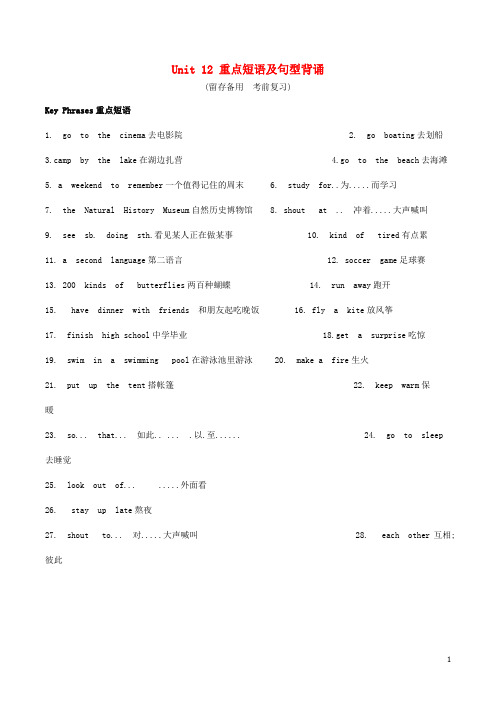
Unit 12 重点短语及句型背诵(留存备用考前复习)Key Phrases重点短语1. go to the cinema去电影院2. go boating去划船3.camp by the lake在湖边扎营4.go to the beach去海滩5. a weekend to remember一个值得记住的周末6. study for..为.....而学习7. the Natural History Museum自然历史博物馆 8. shout at .. 冲着.....大声喊叫9. see sb. doing sth.看见某人正在做某事 10. kind of tired有点累11. a second language第二语言12. soccer game足球赛13. 200 kinds of butterflies两百种蝴蝶 14. run away跑开15. have dinner with friends 和朋友起吃晚饭 16. fly a kite放风筝17. finish high school中学毕业 18.get a surprise吃惊19. swim in a swimming pool在游泳池里游泳 20. make a fire生火21. put up the tent搭帐篷 22. keep warm保暖23. so... that... 如此.. ... .以.至...... 24. go to sleep去睡觉25. look out of... .....外面看26. stay up late熬夜27. shout to... 对.....大声喊叫 28. each other互相;彼此29. play badminton打羽毛球 30. wake... up把... ... 弄醒31. up and down上上下下;起伏 32. go camping野营Key Sentences 重点句型1. What did you do last weekend? 你上周末做了什么?2. How was your weekend? 你周末过得怎样?3.I worked as a guide at the Natural History Museum. 我在自然历史博物馆当过导游。

Unit12 What did you do last weekend?句子词汇精讲【重点短语】1. last weekend 上周末2. go to the cinema 看电影3. go boating 去划船4. camp by the lake 在湖边露营5. go to the beach 去海滩6. study for the English test 为了英语考试学习7. feed some cows 喂一些奶牛8. work as a guide 做导游工作9. over 200 kinds ofbutterflies 超过200多种蝴蝶10. living habits 生活习惯11. be kind of tired 有点儿累12. stay up 熬夜13.as a special gift 作为一个特殊的礼物14. put up the tents 搭建帐篷15. make a fire 生火16. keep sb. warm 使某人保持温暖17.so...that... 如此…以至于…18. get a surprise 吃惊19. see sb. doing sth. 看见某人正在做某事20. jump up and down 上蹦下跳21. climb onto one’s back 爬到某人背上22. shout at/shout to 大声喊叫23. wake …up 把...弄醒24. a useful lesson 有用的一课1.by the lakeby介词, 意为“在……旁边”,表示位置,相当于beside。
拓展:by作介词的其他常见用法:(1)表示移动方向,意为“经过”。
例如:My mother goes by the building every day. 我妈妈每天从这栋楼旁边经过。
(2)表示方式及手段,意为“用,靠,通过”。
He makes a living by fishing. 他以捕鱼为生。
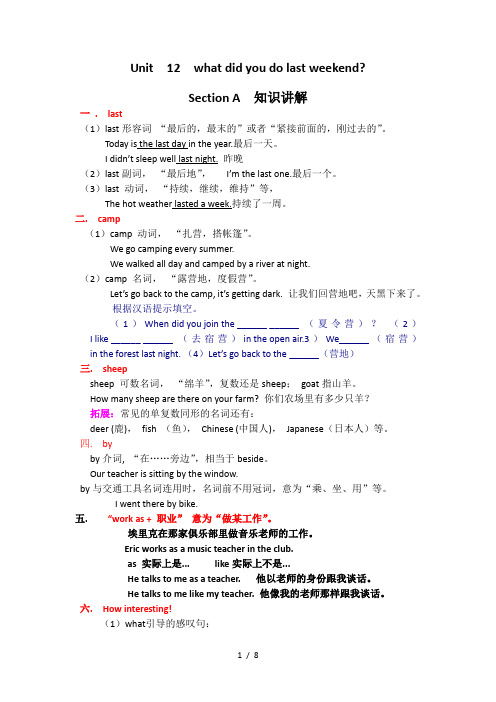
Unit 12 what did you do last weekend?Section A 知识讲解一. last(1)last形容词“最后的,最末的”或者“紧接前面的,刚过去的”。
Today is the last day in the year.最后一天。
I didn’t sleep well last night. 昨晚(2)last副词,“最后地”,I’m the last one.最后一个。
(3)last 动词,“持续,继续,维持”等,The hot weather lasted a week.持续了一周。
二. camp(1)camp 动词,“扎营,搭帐篷”。
We go camping every summer.We walked all day and camped by a river at night.(2)camp 名词,“露营地,度假营”。
Let’s go back to the camp, it’s getting dark. 让我们回营地吧,天黑下来了。
根据汉语提示填空。
(1)When did you join the ______ ______ (夏令营)?(2)I like ______ ______ (去宿营)in the open air.3)We______(宿营)in the forest last night. (4)Let’s go back to the ______(营地)三. sheepsheep 可数名词,“绵羊”,复数还是sheep;goat指山羊。
How many sheep are there on your farm? 你们农场里有多少只羊?拓展:常见的单复数同形的名词还有:deer (鹿),fish (鱼),Chinese (中国人),Japanese(日本人)等。
四. byby介词, “在……旁边”,相当于beside。
Our teacher is sitting by the window.by与交通工具名词连用时,名词前不用冠词,意为“乘、坐、用”等。
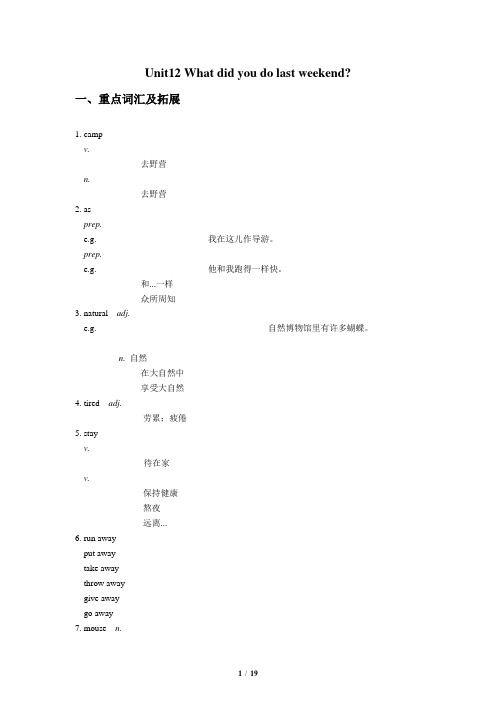
Unit12 What did you do last weekend?一、重点词汇及拓展1. campv. __________________ 去野营n. __________________ 去野营2. asprep. ______e.g. ________________________ 我在这儿作导游。
prep. ______e.g. ________________________ 他和我跑得一样快。
____________ 和...一样____________ 众所周知3. natural adj. ______e.g. ____________________________________自然博物馆里有许多蝴蝶。
______ n. 自然____________ 在大自然中____________ 享受大自然4. tired adj.__________________劳累;疲倦5. stayv.__________________待在家v.__________________保持健康____________熬夜____________远离...6. run away ______put away ______take away ______throw away ______give away ______go away ______7. mouse n.______复数:______8. shout v.____________呼喊...______朝...喊叫(带有情绪)9. language n.____________身体语言____________语言的美____________第二语言10. flyv.______e.g. ____________________________________他们在湖边放风筝。
____________飞去某地n.______e.g. __________________ 我讨厌苍蝇。
Unit 12 What did you do last weekend?Grammar Focus-3cTeaching and learninggoals:一、语言知识:1. Learn to use the following new words and phrases:run away, mice, mouse, baby, shout at, woof, language2. Learn to use the following sentences:What did you do last weekend?I did my homework./ We went shopping.Who visited her grandma? Becky did.Where did she go last weekend? She went to a farm.Who did she go with? She went with her classmates.二、语言功能:Learn to describe the past events using the sentence structures: What did…? Where did/ was/ were…? Who did/ was/ were…?三、学习策略:1. 能正确使用一般过去时态的各种句式来描述过去发生的事情。
2. 能灵活分辨动词过去式的规则变化和不规则变化。
四、情感态度:1. 了解掌握一门外语的重要性。
2. 让学生合理安排上学日和周末的时间,丰富课外活动,劳逸结合,享受美好生活。
【设计意图】目标引领,从四个方面表述了本节语法课的语言知识、语言功能、学习策略和情感目标。
尤其突出了对所学语法在实际生活中的运用能力的培养, 使本节课更具针对性和高效性,更贴近生活并服务于生活。
Teaching and learning steps:Step1. PreviewI.短语连线。
七年级英语下册Unit12Whatdidyoudolastweekend知识点七年级英语下册Unit12Whatdidyoudolastweekend知识点一.短语归纳1.domyhomework做作业2.gotothecinema去看电影3.goboating去划船4.bythelake在湖边5.gotothebeach去海滩6.playbadminton打羽毛球7.visitmygrandma看望我奶奶8.studyfortheEnglishtest为英语测验而学习备考9.theNaturalHistoryMuseum自然历史博物馆10.kindsof各种各样的11.livinghabits生活习惯12.stayup深夜不睡,熬夜13.giveback归还14.playtheguitar弹吉他15.gotothelibrary去图书馆16.inaswimmingpool在游泳池里17.shoutat…冲……大声叫嚷18.highschool高中,中学19.flykites放风筝、20.gocamping去野营21.putup搭建22.makeafire生火23.tellstories讲故事24.eachother互相25.gotosleep入睡26.getasurprise吃惊27.shoutto…呼喊……喊叫……28.upanddown来来回回;上上下下29.wake…up把……弄醒31.onSaturdaymorning在星期六早上32.haveagoodweekend周末过得愉快33.thenextmorning第二天早上34..runaway跑开35.moveinto…移进…二.用法集萃1.go+doing去做某事2.play+球类玩……球3.时间段+ago……前 4.keep+sb./sth.+形容词/副词/介词短语使……保持……5.so+形容词/副词+that句子如此……以至于……6.seesb.doingsth.看见某人正在做某事7.letsb.dosth.让某人做某事8.starttodo/doingsth.开始做某事三.重点句型1.—Whatdidyoudolastweekend?—Ididmyhomework.—上个周末你做了什么了?—我做我的家庭作业了。
Unit 12 What did you do last weekend?词汇精讲1. last(1)last 作形容词时,意为“最后的,最末的”或者“紧接前面的,刚过去的”。
例如:Today is the last day in the year. 今天是今年的最后一天。
I didn’t sleep well last night. 昨晚我没睡好。
(2)last作副词时,意为“最后地”,例如:I’m the last one. 我是最后一个。
(3)last 做动词时,意思是“持续,继续,维持”等,例如:The hot weather lasted a week. 炎热的天气持续了一周。
2. as(1)as作介词时意为“作为”,其后多接表示职业、职务、用途、作用之类的名词。
例如:He works as a worker. 他作为一名工人而工作。
I used one of my shoes as a hammer. 我拿我的一只鞋当锤子使。
(2)as还可以作连词,其后多接从句或介词短语。
例如:All the six students do as the teacher says. 所有这六个学生都按照老师说的做。
3. camp(1)camp 作动词,意为“扎营,搭帐篷”。
例如:We go camping every summer. 我们每年夏天都去野营。
We walked all day and camped by a river at night.我们走了一天,晚上在一条河边宿营。
(2)camp 作名词,意为“露营地,度假营”。
例如:Let’s go back to the camp, it’s getting dark. 让我们回营地吧,天黑下来了。
We spent two weeks at camp this summer. 我们今年夏天在度假营玩了两周。
4. sheepsheep 可数名词,意为“绵羊”,它的复数还是sheep;而goat侧重指山羊。
人教版七年级下册英语Unit 12 知识点总结Unit 12 What did you do last weekend? 一、词汇与短语◆重点单词A部分1.camp 扎营;搭帐篷v.2.lake 湖;湖泊n.3.beach 海滩;沙滩n.4.badminton 羽毛球运动n. 5.sheep 羊;绵羊n.6.as 作为;当作prep. 7.natural 自然的adj.8.butterfly 蝴蝶n.9.visitor 游客;访问者n.10.tired 疲倦的;疲劳的adj. 11.stay 停留;待v.12.away 离开;远离adv. 13.mouse 老鼠;耗子n.14.baby 幼小的adj. 婴儿n. 15.shout 呼叫;喊叫v.16.language 语言n.B部分1.fly 飞v.2.India 印度n.3.kite 风筝n.4.tent 帐篷n.5.high 高的(地) adj.&adv.6.moon 月亮n.7.ago 以前adv.8.surprise 惊奇;惊讶n. 使吃惊v. 9.snake 蛇n.10.scared 惊慌的; 吓坏了的adj. 11.move 移动v.12.start 开始;着手v.13.jump 跳; 跃v.14.wake 弄醒;醒v.15.into 到……里面;进入prep.16.forest 森林n.17.ear 耳朵n.◆重点短语A部分1.stay up late深夜不睡;熬夜2.run away跑开3.shout at……冲……大声4.last weekend 上周末5.go boating 去划船6.camp by the lake 湖畔扎营7.one's living habits某人的生活习惯8.feed sheep 喂羊9.as a guide作为一名导游10.butterfly house 蝴蝶馆11.tell sb. about……告诉某人关于……12.go with sb. 和某人一起去13.have a good weekend 度过一个愉快的周末14.play badminton 打羽毛球B部分1.fly a kite 放风筝2.high school 中学3.put up 搭起;举起4.each other 互相;彼此5.get a surprise 吃惊6.shout to……对……大声喊叫7.up and down 上上下下;起伏8.wake……up 把……弄醒9.a special gift 一件特殊的礼物10.take a long bus ride to 乘长途车去11.put up 搭起;举起12.keep sb. warm 使某人暖和13.on the first night 在第一个夜晚14.tell a story 讲故事15.go to sleep 入睡,睡着16.look out of 朝外看17.read a book about…读关于…的书18.know about 知道关于19.start to do sth. 开始做某事20.jump up and down 跳上跳下21.move into 搬进22.make a fire 生火23.something interesting 有趣的事情24.feel……doing sth. 觉得……正在做某事25.finish high school 高中毕业26.see……doing sth. 看见……正在做某事27.clean one's room 打扫房间28.so……that……如此……以至于……29.on Saturday night 在周六晚上30.have dinner with sb.和某人一起吃晚饭31.stay at home 待在家里32.have a busy weekend度过一个繁忙的周末33.talk show 脱口秀34.study for……为……学习◆重点句子A部分1.—What did you do last weekend? 上个周末你做什么了?—I did my homework. 我做我的家庭作业了。
Module 12____________________________________________________________________________________________________________________________________________________________感叹句, 选择疑问句的理解及应用感叹句是用来表达人的特殊情感的句子,可以表达人的喜、怒、哀、乐等感情色彩。
感叹句可以是一个单词、一个不定式短语、一个由短语构成的独立句,也可以是由what\how引导的句子,句末常用“!”。
1.what引导的感叹句(1)What+a\an+形容词+可数名词的单数形式+主语+谓语!What a beautiful girl she is!(2)What+形容词+可数名词的复数形式+主语+谓语!What important jobs they have done!(3)What+形容词+不可数名词+主语+谓语!What sweet water it is!2.how引导的感叹句(1)How+形容词或副词+主语+谓语!How interesting the dog is!(2)How+形容词+a\an+可数名词单数形式+主语+谓语!How useful a subject it is!(3)How+主语+谓语!How time flies!3.一些特殊形式的感叹句(1)在陈述句、祈使句或疑问句句尾加感叹号变为感叹句,表示某种强烈的感情。
He runs so fast!(2)用一个词或词组表达强烈感情的句子也是感叹句Wonderful!(3)以there,here等副词开头的感叹句。
There he is!选择疑问句提出两种或两种以上的情况,要求对方选择一种情况回答的问句叫选择疑问句。
选择疑问句中的两种或两种以上的情况用or连接,回答时不能使用yes或no,而要用一个完整的句子或其省略形式。
读选择疑问句时,语调一般是前升后降。
选择疑问句可以分为一般选择疑问句和特殊选择疑问句两种。
(1)一般选择疑问句:一般疑问句+or+被选择部分?--Do you like apples or bananas?--I like apples.(2)特殊选择疑问句:特殊疑问句,+A or B?--Which would you like better,tea or coffee?--Coffee better.单项选择1.__________great courage he showed!A.WhatB.What aC.How aD.How答案:A解析:考查感叹句的用法,感叹句的结构是What+(a\an)+形容词+可数名词+主语+谓语!或者How+形容词或副词+主语+谓语!courage是不可数名词,故答案是A。
2.__________exciting news it is!A.WhatB.What anC.HowD.How an答案:A解析:考查感叹句的用法,感叹句的结构是What+(a\an)+形容词+可数名词+主语+谓语!或者How+形容词或副词+主语+谓语!News是不可数名词故选A。
3.--__________a lovely girl she is!--So she is!A.WhatB.What aC.HowD.How a答案:B解析:考查感叹句的用法,感叹句的结构是What+(a\an)+形容词+可数名词+主语+谓语!或者How+形容词或副词+主语+谓语!故选B。
4.--Do you like listening pop music__________classic music?--Classic musicA.andB.orC.soD.but答案:B解析:考查一般选择疑问句的用法。
选择疑问句中的两种或两种以上的情况用or连接故选择B。
5.--__________do you like better,football or basketball?--Basketball.A.WhichB.WhereC.WhyD.What答案:A解析:考查特殊选择疑问句的用法,特殊疑问词用which故选择A。
基础演练单项选择1. __________fast runner she is!七年级下A.WhatB.What aC.HowD.How a2.__________great picture!A.WhatB.What aC.HowD.How a3.__________bad we ather it is!We can’t go boating.A.WhatB.What aC.HowD.How a4.--Can you tell me it is a dog_________a bear?--A dog.A.andB.orC.soD.but5.--__________do you want to visit,America or Canada?--Canada.A.WhichB.WhereC.WhyD.What答案:BBABB巩固提高改写下列句子1.It is a nice present.(改成由what 引导的感叹句)________________________________________2.It is a nice present.(改成由how 引导的感叹句)________________________________________3.It is fine weather.(改成由what 引导的感叹句)________________________________________4.It is fine weather.(改成由how 引导的感叹句)_________________________________________5.Do you like cats? Do you like dogs?(改成选择疑问句)_________________________________________答案:1.What a nice present it is!2.How nice a present it is!3.What fine weather it is!4.How fine weather it is!5.Do you like cats or dogs?单项选择1.__________a beautiful car it is!I have never seen it before.A.HowB.WhenC.WhoD.What2.--__________ it is today!--Yes,shall we go fishing?A.How fine weatherB.What fine weatherC.What a fine weatherD.How fine the weather3.--__________fine day!Shall we go for a walk?--That sounds great!A.WhatB.What aC.HowD.How a4.__________delicious the dish is!A.WhatB.What anC.HowD.How an5.__________ good time we had during the May Day holiday!A.HowB.WhereC.WhoD.What6.Who is your maths teacher,Lee_________Wang?A.andB.orC.soD.but7._________excited they are!A.WhatB.What anC.HowD.How an8.--_________is your maths teacher,Lee or Wang?--LeeA.WhoB.WhatC.WhenD.Where9.--It is said that a foreign teacher will teacher will teach us English next term.--Wow!__________!A.What an excited newsB.What a exciting newsC.How excited the news isD.How exciting news10.--Whose book is it,Lucy’s__________Lily’s?--Lily’sA.andB.orC.soD.but完形填空Probably you have seen photos of the Grand Canyon. But you must go there 1 to feel its size and beauty. The Grand Canyon is one of the greatest 2 wonders of the world.The Colorado River made the Grand Canyon over millions of years. Slowly, the river cut down 3 hard rocks. At the same time, the land was 4 . Today the canyon is very 5 . It’s also very 6 , about 20 kilo-meres. And 7 its height, there are different kinds of plants and animals on both sides of the canyon.The canyon looks different at different times of the day, and 8 different seasons and weather. At sunrise, the red, gold, brown and orange colors of the rocks are 9 clear and bright. Whether you see the Grand Canyon from the top or the bottom, it will bea(n) 10 that you will never forget.1. A. you B. your C. yours D. yourself2. A. natural B. modern C. ancient D. national3. A. along B. through C. across D. past4. A. rise B. rising C. rose D. risen5. A. more B. dangerous C. deep D. low6. A. long B. deep C. high D. wide7. A. as a result B. because of C. thanks to D. thanks for8. A. in B. on C. at D. for9. A. especially B. friendly C. hardly D. differently10. A. interview B. trip C. visit D. experience答案:单项选择 1--5DBBCD 6--10BCACB完形填空 1--5 DABBC 6--10DBAAD____________________________________________________________________________________________________________________________________________________________昌平区期末1. My grandpa often told _____ interesting stories.A. IB. meC. myD. mine2. The meeting will begin ________ 4:30 this afternoon. Don’t forget it.A. onB. inC. atD. for3. --- Can you come and play with us this evening?--- I’d love to, ___________I have a lot of homework to do.A. andB. soC. orD. but4. Spring is coming and there ________ flowers everywhere.A. isB. areC. wasD. were5. --- __________ are all these together?--- 425 yuan.A. How muchB. How manyC. How longD. How often答案:BCDBA单项选择:1.__________good advice!A.WhatB.What anC.HowD.How an2.__________bad weather it is!We had better stay at home.A.WhatB.What aC.HowD.How a3.__________sweet music!A.WhatB.What aC.HowD.How a4.Playing games__________much time,I think.A.spendsB.takesesD.pays5.My family usually__________ music at the concert on holiday.A.listenB.hearC.hear ofD.listen to6.Mozart wrote__________piece of music for the classic orchestra.A.hundredB.hundreds ofC.hundred ofD.hundreds7.The boy works_________harder than his elder sister.A.evenB.veryC.prettyD.quite8.Sorr y,I can’t play __________ basketball with you this afternoon.My father asked me to stay at home and play __________guitar.A.The,theB.\,\C.the,\D.\,the9.She can sing very well.She has a beautiful __________ .A.soundB.noiseC.voiceD.cry10.He will come here on time,__________?A.won’t heB.will heC.doesn’t heD.is he完形填空:Johnny Sylvester, eleven years old, was in bed in the hospital. A few days ago, when he was __1__in a football game, he fell and his head hit the ground. The doctors thought he might ___2____get well.“He seems to have given up hope. So medicine won’t ___3__. Maybe he needs something else,” said one of the doctors. “When I visit Johnny, all he ever says is that he would like to __4___ Babe Ruth.”To meet Babe Ruth, of course, was not possible. Babe Ruth was as important a man in America ___5___the president himself, and he was the most famous baseball player in the game.The next day Johnny’s father managed to __6__Babe Ruth about the story of Johnny on the phone. Twenty-four hours later, when Johnny lay in his ___7___room, in walked Babe Ruth. Young Johnny couldn’t believe it really was Babe.Babe Ruth sat down at Johnny’s bedside and said, “Now listen, kid, you’ve got to get well. I’ve bought you a new American League baseball. You must start ___8____it”Sylvester just stayed there, saying nothing.For Johnny this was the beginning of a new life, one he thought he would never __9__. To his doctors’ __10__, young Sylvester walked out of the hospital on his own a few weeks later. He was also able to live a healthy life---all because of the present of Babe Ruth.1. A. playing B. swimming C. riding D. growing2. A. always B. often C. usually D. never3. A. win B. do C. eat D. drink4. A. feed B. read C. meet D. defeat5. A. as B. than C. if D. until6. A. say B. speak C. tell D. talk7. A. hospital B. school C. village D. farm8. A. reading B. sweeping C. throwing D. making9. A. refuse B. see C. send D. agree10. A. experience B. opinion C. advice D. surprise阅读理解ASeveral summers ago, Joe Smith, the coach of a football team, and his family were spending their holiday in a small town. One rainy afternoon, it was impossible for them to go out to do anything interesting, so the family decided to go to the cinema. Joe, his wife and their children walked d own to the town’s only cinema, bought tickets and went into the hall. The lights were still on, and there were just six other people there. As Joe entered, some of them saw him and started clapping (鼓掌).Joe gave them a smile and turned to his wife. “Aha, I can’t believe they know me and I’m getting a warm welcome here,” he said, “I guess they saw my games on TV.”They sat down and then a young man came over and reached out his hand to shake hands with Joe. “Thanks a lot,” replied the coach, “I just can’t believe you know who I am.” The man looked puzzled (困惑的). “All I know,” replied the man, “is that they would not show the film until at least ten people bought tickets.”1. Joe and his family decided to go to the cinema because _________.A. they enjoyed seeing films in a small townB. it was impossible for Joe and his team to have a football match that afternoonC. they wanted to try something new for a changeD. nothing else could interest them on a rainy afternoon2. When Joe and his family got to the cinema __________.A. all the tickets had been sold outB. the film had been on for quite some timeC. people in the cinema were waiting anxiously (焦急地)D. everyone in the cinema was clapping3. How did Joe feel when he was given such a warm welcome?A. He felt surprisedB. He felt worriedC. He felt proudD. He felt both surprised and proud4. How many children did Joe have?A. At least oneB. At least twoC. At least threeD. At least five5. Why did the people in the cinema welcome Joe and his family so warmly?A. Because he was the coach of a football teamB. Because he and his family were new-comers in the small townC. Because they had seen Joe’s games on TVD. Because they could not see the film until enough people had arrivedBIn the big cities of Europe and America — London, Paris, New York, people are moving out of the city. They are usually rich families with much money, and they want to live a quieter life. They are tired of the noises and the dirty air of the city, tired of the crowded streets, crowded trains and buses. They don’t want to sit in traffic any more. They want a house with a garden, and clean air that is not polluted.So they move out. Some don’t move very far, just a l ittle way out of the city, to the towns near the cities. Other people move to real countryside, with sheep, cows and horses, and green fields! There, they start new lives and try to make new friends.Not all those who move from the city to the countryside are happy. After two or three years, many people feel that it was a big mistake. There isn’t much to do. Country people are very different and aren’t always friendly.As a result, quite a lot of people move back to the city. “It’s wonderful to see crowds in the streets and cinema lights,” they say. “I’m so glad I’m back in the city!”1. Some city people move out of their city because of _____.A. crowds and pollutionB. friendly neighborhoodsC. making moneyD. cows and sheep2. Why do some people move back to the city again? Because _____.A. they can breathe fresh and clean airB. there are big shops and cinema lightsC. they still want to live their city lifeD. they can make many new friends3. Which of the following sentence is wrong according to the passage?A. Many people love their city’s colorful life.B. They enjoy seeing animals in the country.C. All the people move out far from the city.D. Sometimes country people are not friendly.CYou are watching a film in which two men are having a fight. They hit one another hard. At the start they only fight with their hands. But soon they begin hitting one another over the heads with chairs. And so it goes on until one of the men crashes (撞击) through a window and falls thirty feet to the ground below. He is dead!Of course he isn't really dead. With any luck he isn't even hurt. Why? Because the men who fall out of high windows or jump fromfast moving trains, who crash cars of even catch fire, are well trained. They do this for a living. These men are called stuntmen. That is to say, they perform tricks (花招,手段). Here are two sides to their work. They do most of the things you see on the screen. For example, they fall from a high building. However, they do not fall on to hard ground but on to empty cardboard boxes covered with a mattress (床垫). Again, when they hit one another with chairs, the chairs are made of soft wood and when they crash through windows, the glass is made of sugar! But although their work depends on trick of this sort, it also requires a high degree of skill and training. Often a stuntman success depends on careful timing. For example, when he is "blown up" in a battle scene, he has to jump out of the way of the explosion just at the right moment.Naturally stuntmen are well paid for their work, but they lead dangerous lives. They often get seriously hurt, and sometimes killed. A Norwegian stuntman, for example, flew over the edge of a cliff (悬崖) a thousand feet high. His parachute (降落伞) failed to open, and he was killed. Although it is full of deadly dangers, this is no longer the work for men only. Men no longer dress up as women when actresses have to perform some dangerous actions. For nowadays there are stuntman too!1. Stuntmen are those who ______.A. often dress up as famous actorsB. prefer to lead dangerous livesC. often perform dangerous actionsD. often fight each other for their lives2. What’s the meaning of the underlined sentences in the first paragraph?A stuntman should _______.A. crash bravely though a window made of sugarB. do the well-planned activity at a very momentC. open his parachute when he jumps down the cliffD. have got a high degree of skill and training3. Which could probably the best title of this passage?A. Fights in the Movies.B. Crashing Out of the Window.C. Exciting Films Today.D. Most Dangerous Work.答案:单项选择1--5BABBD 6--10BADCA完形填空 1--5DCCBC 6--10BBADB阅读理解:DCDBD ACC CBD。